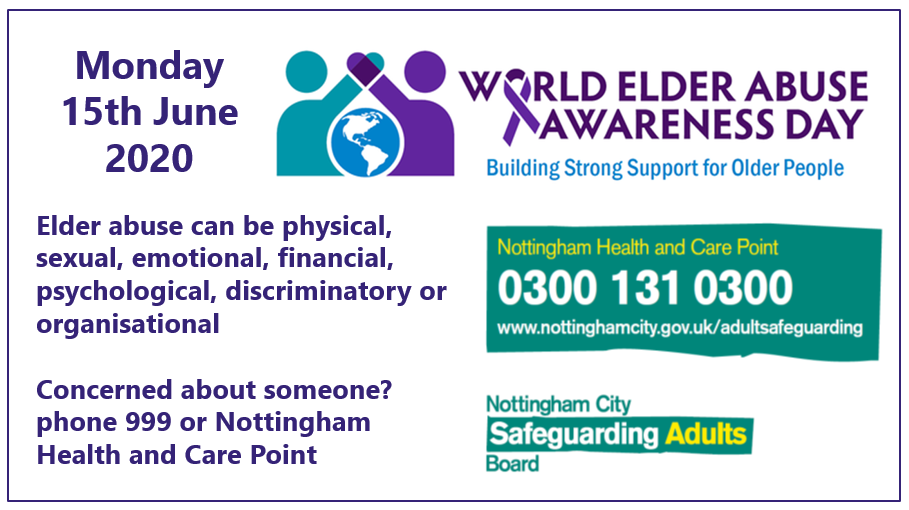Monday 15 June 2020 will mark World Elder Abuse Awareness Day. In Nottingham we believe that every adult should be able to live safely, free from abuse and neglect. Most adults are able to do this, but research indicates that nationally almost half a million people aged over 65 will experience some form of abuse or neglect.
World Elder Abuse Awareness Day is an international annual event to take action against this increasingly serious problem that affects the health and wellbeing of so many.
Elder abuse is any act that causes harm to an older person – it may be physical, sexual, social, emotional, financial, psychological, discriminatory or organisational. Unfortunately, someone the older person knows often carries out the abuse. It can happen in care settings as well as at home.
As older adults become more physically and mentally frail, they are less able to take care of themselves, stand up to bullying, or fight back if attacked. In addition, they may not be able to see or hear as well as they used to allowing unscrupulous people to take advantage of them.
In 2020, the risk of abuse to older people has increased because many are self-isolating in their own homes as a result of COVID-19, whilst others find themselves living more closely than usual with other adults, which may cause additional tensions.
Councillor Eunice Campbell-Clark, Age Friendly Nottingham’s Older Citizens Champion, said:
“Family, friends and neighbours play a crucial role in helping to protect older people, particularly at the moment when so many are isolated at home. I would like to appeal to everyone to look out for signs of all types of elder abuse and listen carefully to any concerns that may be mentioned by older people themselves.
If you are concerned about someone, don’t hesitate to contact the police or Nottingham Health and Care Point on 0300 131 0300”.
What form does abuse take?
Abuse and neglect can take many forms including physical, emotional, financial, sexual, spiritual or social. Abuse and neglect can include withholding medications or the necessities of life. Some types of abuse and neglect violate an older adult’s basic rights, and several types are crimes.
- Physical abuse includes violence, inappropriate restraint, or rough treatment, even if it does not result in an injury.
- Emotional abuse includes name calling, intimidation, threats, or any treatment that offends an older person’s sense of dignity and self-worth. Emotional abuse is often used to control an older person.
- Financial abuse is the most common form of abuse reported by older adults. Examples of financial abuse include pressuring an older adult with requests for money, using an older adult’s property or money without their permission, or improperly using one’s authority as a power of attorney.
- Scams and Doorstep Crime are an increasing problem for older people.
- Sexual abuse occurs when a person pressures an older adult for intimacy, sexually harasses or sexually assaults them. Sexual abuse can also include making sexual comments or jokes, and unwanted touching or leering.
- Violations of rights means ignoring older adults’ rights to privacy, information or community supports they are eligible for.
- Neglect refers to situations where a person has a duty to provide care or help to an older adult, but does not provide that care. For example, the caregiver might stop paying the bills, providing food, medication, or other help to the older adult. Or, they may leave a dependent elderly person alone for long periods of time.
If you are concerned about someone, don’t hesitate to contact the police or Nottingham Health and Care Point on 0300 131 0300.

